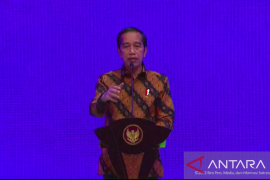"The July inflation must be higher than that of June but it will be lower than the inflation rates during the post-fasting Idul Fitri or Lebaran months in previous years," Enny Sri Hartati said here on Saturday.
The predicted figure of inflation was influenced by transportation fares, demand for housing in facing the new academic year and the higher demand for food, she said.
The prices of staple food were relatively stable which were lower than during Lebaran in the previous years, Enny opined.
"This years Lebaran festivities coincided with the harvest season so the prices of chilli and shallots were not too high," she said.
However, a good trade regulation is needed so that farmers can enjoy proper yields while consumers can also buy staple foods with relatively affordable prices, she argued.
The decline in purchasing power of the public since 2013 had also contributed to the inflation rates until this year, she said.
"Regional Minimum Wage admittedly increased, but the rise of basic electricity tariffs put pressure on the purchasing power of the public," she explained.
In June 2014, the inflation rate was recorded at 0.43 percent. When the Lebaran festivity fell in August last year, the inflation rate was recorded at 1.12 percent.
The Inflation rate in July will remain below one percent, with 0.75 percent (month-to-month) and the yearly inflation 4.6 percent (year-on-year, Bank Mandiri chief economist Destry Damayanti predicted.
Inflation was annually impacted by a price hike during the fasting month of Ramadhan and Idul Fitri Holidays, but it was well-controlled this year, Destry said.
Market demands had also increased as a result of the school year and presidential momentum in 2014.
"I believe the government has been successful enough in controlling the price hike, especially in food," Destry noted.
The collapse of Comal Bridge in Pemalang District, Central Java, had caused the logistic costs to increase, which had an impact on the prices, Destry pointed out.
"That is not significant however, as the government has provided a quick response to stabilize the market price," she said.
The low inflation in July was also triggered by a drop in gold prices, Destry added.
The gold bar price of PT Aneka Tambang, a state-owned mining company, a few days ahead of Eid, dropped from Rp529 thousand to Rp528 thousand per gram, as well as its buyback, which was Rp468 thousand per gram, Rp1thousand lower than the same period last year.
Destry added that the strengthened rate of the rupiah to US dollar had also curbed inflation in July.
"We have been helped by the appreciation of the rupiah throughout July," she said.
However, the second increase of electricity fares for industries in early July might cause an increase in inflation, Destry noted.
"As food prices are under control, inflation probably will remain below one percent," she said.
The inflation rate in June 2014 was 0.43 percent compared with the Idul Fitri Holidays in the previous years, which had always been up to one percent. However, this years inflation was low.
The inflation during the Idul Fitri Holidays in August 2013, for example, had reached 1.12 percent.
(A014/o001)
(INE)
EDITED BY INE.
Editor: Suryanto
Copyright © ANTARA 2014











